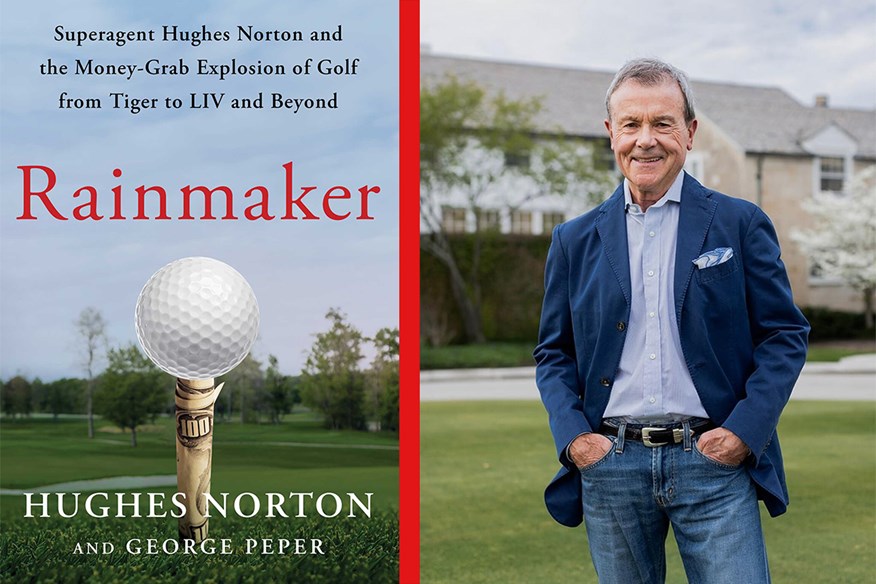EXCLUSIVE: “Tiger Woods was unbelievably self-centered and selfish – he totally lacked empathy”
Last updated:
Hughes Norton was golf’s first superagent, a man who worked for Tiger Woods and Greg Norman – and was ruthlessly sacked by both. Ahead of Norton’s tell-all new book, he gave us the bombshell-laden inside story.
There was a time when Hughes Norton would have featured high up on our list of the Top 100 Most Influential People in Golf. He was a real-life Jerry Maguire, a man once described as the ‘most powerfully hated agent in golf’.
For the better part of three decades, Norton managed the lives and affairs of the best golfers on the planet. Seve Ballesteros (temporarily), David Duval, Tom Watson, Hal Sutton, Lanny Wadkins, Peter Jacobsen and Curtis Strange were all on his books at IMG. There were several more besides, though it was his relationships with Greg Norman and Tiger Woods that dominate the pages of an engrossing new book about the cut-throat world of sports management.
In Rainmaker, co-written with former Golf magazine editor George Peper, Norton takes readers behind the scenes at IMG and provides a colorful and critical account of the negotiations and betrayals that led to his meteoric rise and abrupt downfall.
The book opens with Norton’s greatest success story: the day he officially joined Team Tiger in August 1996 and orchestrated a $60 million deal (before bonuses) for Tiger to endorse Titleist and Nike over the next five years.
“Never has a sports agent in any sport, not just golf, set up his client at the beginning of his or her professional career as successfully as I did,” he says now.
“Here’s this kid, who hasn’t even hit a ball as a professional, and he has $60 million guaranteed over the next five years, which is like $100 million or more in today’s money. Even if he had missed every cut in his first year, all that was guaranteed.
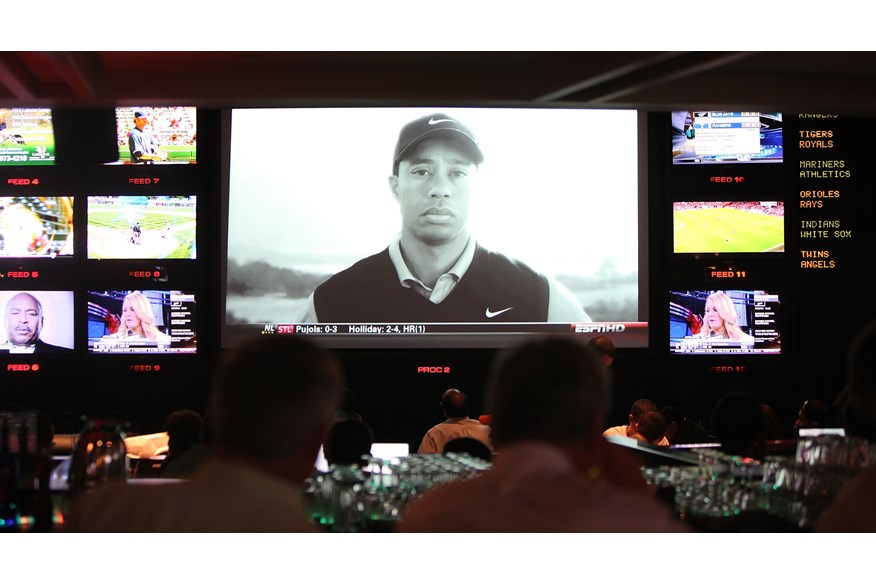
And there was more to come. Twenty-five million dollars from Amex for five years, $4.6 million per year for three years from a Japanese beverage maker, another $250,000 from Wheaties to be the face of their cereal… Norton set Tiger up for life, only to then be cast aside two years later. He recalls the exact moment, on September 26, 1998, when an “emotionless Tiger stood zombie-like” at the front door of Isleworth clubhouse and told him he was fired, then walked away. He hasn’t heard from him since.
“The worst part honestly was that there was no explanation,” Norton tells TG. “It’s just so bizarre the way Tiger severs relationships with people in his life, whether it’s caddies or girlfriends or managers. I would love to sit down with Tiger today and say, ‘Flashback 25 years, what was the reason? You never gave me any indication that something was wrong or that you weren’t happy’. That leads into my feelings of betrayal because it was very tough to swallow.”
The loss of Tiger cost Norton his job at IMG just 60 days later, when his mentor and boss Mark McCormick handed him a termination contract over breakfast. He was paid just under $9 million ($16.5 million in today’s money) not to work, nor say anything to the world about his former employee for the next 10 years. But his exile from public life lasted far longer.
It wasn’t until three years ago that he says he finally became relevant again. The civil war between LIV and the PGA Tour inevitably sparked interest in his relationship with two of its main protagonists, which is how his memoir came to be.
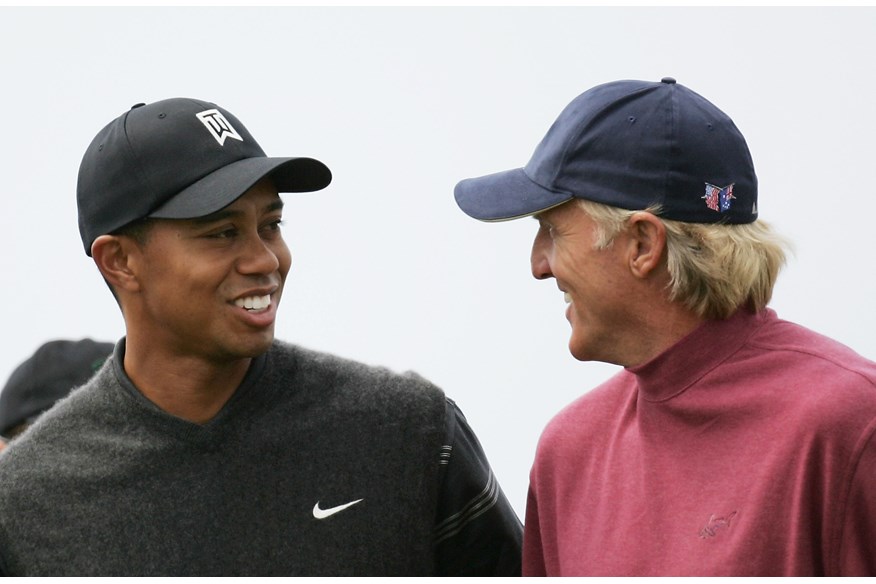
“We got lucky in that sense because I don’t think our publishers were that keen on yet another golf book,” explains Norton. “But then all of a sudden our pitch was, ‘Who knows these two protagonists better than Hughes Norton who represented them both?’ That’s what got the deal done.”
Norton describes how he first met Tiger when he was 13 and had posters of Norman and Jack Nicklaus on his bedroom wall. He put his father, Earl, on IMG’s payroll as a junior talent scout and was also responsible for bringing Butch Harmon on board as Tiger’s swing coach. “I spent seven years cultivating a relationship, working with his dad and Tiger. If you talk about a delayed pay-off, it’s probably the longest of all time.”
Norton helped launch Tiger’s celebrity and made a lot of people very rich, including himself. In the first year of their agreement, IMG pocketed $4 million in fees and received 1,545 requests for a piece of Tiger’s time. “We were in the business of pissing off people,” admits Norton. “We had to say no so many times. He would get up at six in the morning just to avoid the crowds to play practice rounds. It was just chaos and the attention really bothered him.
“Fame was something that was uncomfortable for Tiger. It really was. It was an intrusion into his life. Greg, on the other hand, loved the adoration, the attention, and the wealth with the Gulfstream jets and the seven Ferraris in the garage. But Tiger couldn’t care less. At one point he said, ‘You know there’s this $40 million from Nike, $20 million from Titleist, it’s paper money, Hughes’. He picked up a winner’s cheque from a tournament he’d just won and said, ‘See this, this $300,000 I won in Las Vegas, that’s real to me. This other stuff is paper money. It’s an interesting outlook but it showed you how narrow-focused he was.”
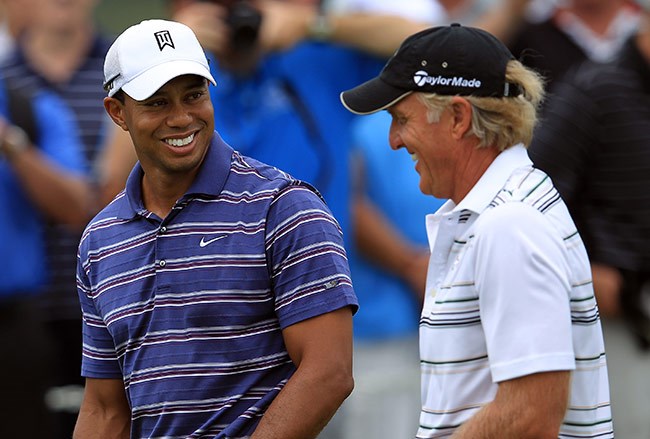
Norton uses a back catalog of locker room experiences and intimate conversations to illustrate his point. The most revealing is the time Tiger decided to change his swing while watching a re-run of his runaway victory at the 1997 Masters.
“That was extraordinary, it took my breath away. I did it with Greg, watching a tape of a win, and it was always fun to hear the input from the player. And then there’s Tiger Woods, hitting a shot to 20 feet and he’s like, ‘Oh, that sucked. There’s absolutely no excuse with an 8-iron, I’ve got to be inside 10 feet’. And on and on it went until he said I’ve got to change. It was quite amazing really, beyond unusual, but it was the pursuit of excellence to the nth degree.”
Norton seemingly has a story about every major figure in golf – some legendary, some hitherto kept secret. He reveals that he hired Augusta National chairman Fred Ridley straight out of law school and even interviewed Colin Montgomerie for a job before his colleagues realized that they should be the ones representing him.
Norton laughs about the day he tried to close the sale of Raymond Floyd’s bachelor pad and walked in to discover a 10ft by 20ft mirror on the ceiling of his bedroom. Another time he was presented with a suitcase full of gambling winnings in the locker room and asked to stow it away in IMG’s offices. “Again, it was Raymond handing me $20,000 cash,” he says, incredulously. “I opened it up and there were stacks of hundred-dollar bills. I had never seen so much money piled up. I wasn’t leaving until the next day, so I had to go back to my hotel room and I think I slept with my hands wrapped around the handles!”
For many of his formative years, Norton was learning on the go and pitching to anyone within earshot. Signing Tom Watson – albeit on a trial agreement – in 1975 was his first big break, though it proved to be a false start. He was gone within a year, a pattern which would repeat itself with Seve years later. Norton had break ups with the best, including Mark O’Meara, Floyd and Wadkins.
He dedicates two chapters to the 11 years he spent representing the “narcissistic” Norman, who he describes as having a “consuming need to be visible and relevant”. He even accuses Norman of stealing McCormack’s sales pitch for a second tour and dressing it up as LIV Golf almost 50 years later.
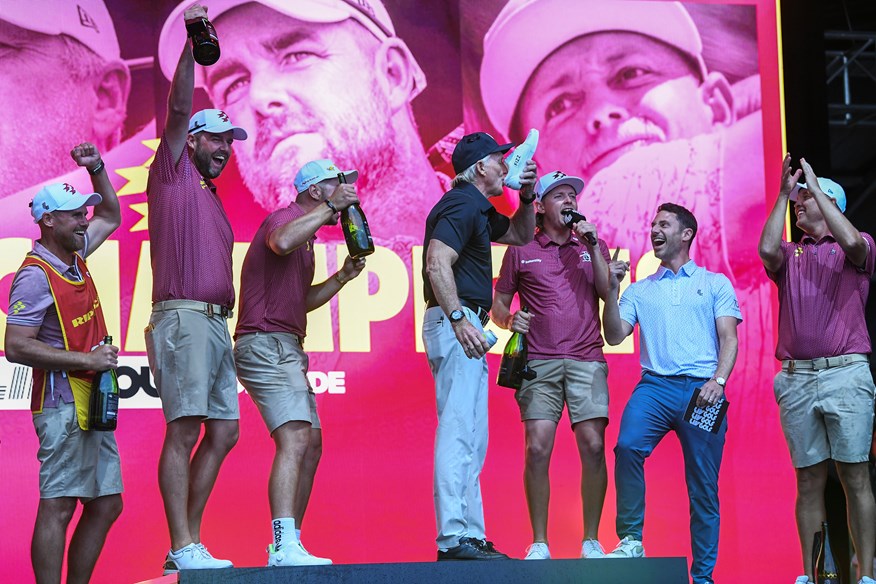
Norton goes on to reveal that he helped generate $50 million for Norman, more than five times the amount of his on-course earnings for the same period. Several times, he says, Norman asked him to leave and work exclusively for him. Each time he declined. By the time the Australian decided to cut ties with IMG in late 1993, Norton bore the brunt and was demoted from the head of IMG’s golf division.
Does he regret how everything played out?
“No, I don’t have any hard feelings there,” admits Norton. “Greg was still loyal enough to stay 11 years with me. Tiger? He was different. He was pretty disloyal to say, ‘See you later’, after such a short time.”
Even more revealing than the deals he signed – and the lawsuits he avoided – are the details and descriptions of the players he represented. In discussing them, he is particularly critical about Tom Watson’s business acumen and Tiger’s social skills, both of which amounted to very little.
“Tiger was unbelievably self-centered,” he says. “He focused on one thing and one thing only from an early age, which was to become the greatest golfer in the history of the game. He was quite selfish; his needs were all that mattered. He never really learned how to interact with people, so there was a total lack of empathy.”
What is clear is that Norton still holds onto a lot of bitterness, though it would be unfair to depict his memoir as little more than a score-settling exercise. There is self-deprecation throughout, an acknowledgment of his own faults and failures as much as others. The pressure of delivering for his clients and working 60 and 70-hour weeks ultimately took a toll on his marriage, which ended in divorce, as a lot of his relationships often did.
In writing about them with startling honesty and depth, Norton lets you see a different side to a sport and a profession which has an uneasy bond with ethics and loyalty. For that alone, Norton should be commended. It is the most enlightening book you’ll read this summer.
Rainmaker: Superagent Hughes Norton and the Money-Grab Explosion of Golf from Tiger to LIV and Beyond will be available in the UK on June 6. RRP £20
SUBSCRIBE TO TODAY’S GOLFER: Print and Digital access, discounts and rewards!
-
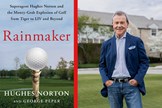 Rainmaker is the new book by Hughes Norton, former agent to Tiger Woods and Greg Norman
Rainmaker is the new book by Hughes Norton, former agent to Tiger Woods and Greg Norman
-
 Greg Norman downs a beer from a shoe on stage at LIV Golf Adelaide.
Greg Norman downs a beer from a shoe on stage at LIV Golf Adelaide.
-
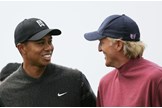 Tiger Woods of USA and Greg Norman of Australia share a joke during the first round of the 133rd Open Championship at the Royal Troon Golf Club on July 15, 2004 in Troon, Scotland.
Tiger Woods of USA and Greg Norman of Australia share a joke during the first round of the 133rd Open Championship at the Royal Troon Golf Club on July 15, 2004 in Troon, Scotland.
